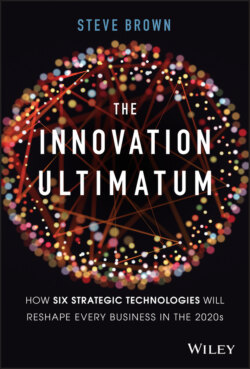Читать книгу The Innovation Ultimatum - Steve Brown - Страница 28
Machine Vision: Computers Open Their Eyes
ОглавлениеWith the advent of artificial intelligence, machines have evolved eyes and ears. Computers can now see, hear, and “understand” something about the world that they inhabit. This understanding is still rudimentary. Computers can recognize an image of an apple and correctly categorize it with the five letters a-p-p-l-e, but they don't understand what an apple is, that it grew on a tree, or what it tastes like.
Machine vision has many interesting applications across a wide range of industries. Stocktaking robots audit shelf contents in grocery stores. Facial recognition algorithms turn faces into passwords. Agricultural robots spot-spray herbicide on weeds. Quality assurance AIs perform visual inspection on the manufacturing line. Autonomous machines—robots, drones, and self-driving vehicles—all rely on machine vision, too.
EarthNow, an ambitious startup funded by Bill Gates, Airbus, Softbank, and others, is a splendid example of machine vision's future potential. EarthNow will operate a constellation of satellites, each containing four powerful, high-definition cameras. The company's goal is essentially to create a real-time version of Google Earth, though with an important twist: Artificial intelligence, built into the satellites, runs applications to interpret camera images and add intelligent insight. These applications will reveal important details about activity on our planet.
A lightning strike in a remote location can start a devastating forest fire that rages out of control. Detection, rapid response, and early containment may save millions of acres of land from incineration, prevent damage to structures, and save lives. With EarthNow, global fire detection is just another application that runs on the satellites. The network becomes an eye in the sky that watches for fire starts and automatically alerts local authorities, 24/7/365.
EarthNow has proposed a range of other exciting applications for their satellite constellation. The system could provide real-time traffic information to city managers, real-time crop health information to farmers, and alert law enforcement or government agencies to illegal fishing, mining, and logging activity. Marine biologists will be able to track whale migration and volcanologists will monitor volcanic activity. Global asset tracking applications include tracking ships at sea, trucks on the road, planes in the air, and shipping containers in transit. Other applications include improved weather forecasting, law enforcement, and news coverage. EarthNow is a powerful platform that raises serious privacy concerns. This is why EarthNow chose to build machine learning capabilities into the satellites themselves. Users have very limited access to data from applications—real-time traffic data, the GPS locations of whales—but not the image data itself. The machine vision capabilities of the EarthNow platform present an exciting new set of opportunities for research scientists, public safety professionals, local governments, and a wide range of businesses.
